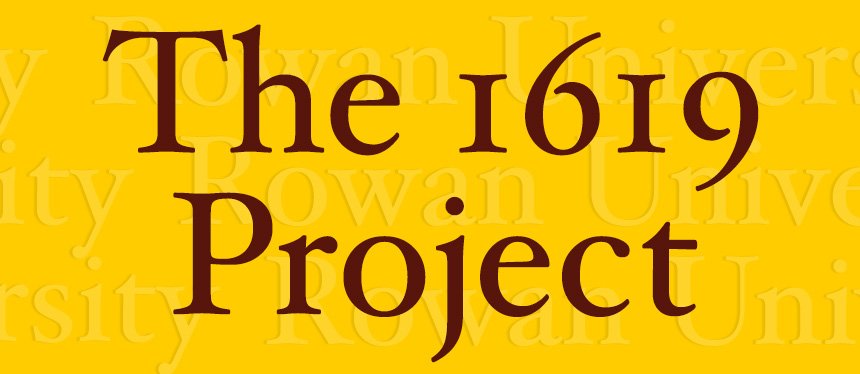The 1619 Project @ Rowan
The 1619 Project @ Rowan
The 1619 Project @ Rowan to hold a series of events to recognize the 400th anniversary of the first arrival of Africans in British North America
The 1619 Project @ Rowan will hold its second in a series of events recognizing the 400th anniversary of the arrival of the first ship carrying more than 20 Africans to Colonial America in August of 1619.
“Conversations and Food,” a discussion about the critical role of African-descended people in the development of democracy in America is open to the Rowan community and will take place on Monday, February 3, at 6:30 p.m. in the Chamberlain Student Center Ballroom. The event is inspired by the 1619 Project and podcast, an ongoing initiative from the New York Times Magazine.
The 1619 Project @ Rowan is a student and faculty led committee working to create and promote events that revolve around the history, struggles, and accomplishments of African Americans in honor of the 400th anniversary of slavery in America.
“We wanted to bring the 1619 Project to Rowan in a new way. We wanted constituents from all corners of the University involved, so that it is meaningful for everyone. We have faculty, staff, and students on the committee, and are involving all three groups in the events,” said Emily Blanck, executive director, Rowan Center for Interdisciplinary Studies and associate professor of History,
1619 Project @ Rowan Inaugural Event “Groove”
The 1619 Project opened on December 5, 2019 with an electric dance performance, "Groove." Choreographed by Paule Turner of Rowan's Dance and Theater Program in conjunction with the Camden Sophisticated Ladies Dance Group, the performance played with the historical and contemporary experience of freedom, joy, pride, and community that has been a part of the African American experience for 400 years. The performance embraced inclusion and diversity and brought it to life. After the show, journalism professor Candace Kelley interviewed professors Paule Turner and Laurin Plant about freedom in producing art and its meaning as black artists.
According to associate professor of history Chanelle Rose, who is also coordinator of the Africana Studies major at Rowan, “The 1619 Project @ Rowan is timely, powerful, and necessary for academic institutions interested in not only educating students about the rich history of African Americans but also showing how the legacy of slavery is deeply interwoven into the fabric of American society.”
The 1619 Project @ Rowan will offer a year-long series of events with programming that engages and inspires learning and discussions around the contributions, lived experiences, and accomplishments of blacks in America during the spring and fall semesters of 2020. Upcoming events include:
SPRING 2020
1619 Conversations and Food (open to the Rowan community)
Each evening will be a chance to sit around the dinner table, eating foods of the African Diaspora, learn and discuss about an issue inspired by the 1619 Project podcast, like economics, environment and health care.
Mon. Feb 3, 6:30pm-8:30pm Student Center Ballroom
Wed. March 4, 7:30pm-8:30pm Student Center Ballroom
Wed. April 22, 6:30pm-8:30pm Student Center Ballroom
1619 to the Present, History of Black Music
This evening, organized by Lourin Plant and his students, will feature a playlist of key moments in black music, ranging from spirituals, blues, and jazz to R&B and Hip Hop, performed by the Rowan Chorus. Thursday, March 26 at 5:00 pm.
FALL 2020
1619 Stories
Storytellers will be invited to present a significant personal story in a compelling story-telling format.
1619 Talent Night: The Grand Finale of the 1619 project
Students will share their talents in a RAH talent show night and in the student run literary magazine, Avant. It will be a fun and engaging night, encouraging students to share their talents and understanding and feeling the impact of 1619.
The 1619 Project is an ongoing initiative from the New York Times Magazine that began in August 2019, the 400 anniversary of the beginning of American slavery. It aims to reframe the country’s history by placing the consequences of slavery and the contributions of black Americans at the very center of our national narrative.”




